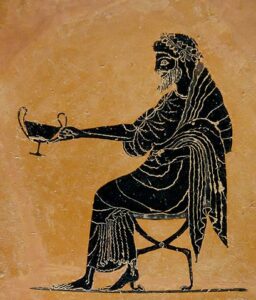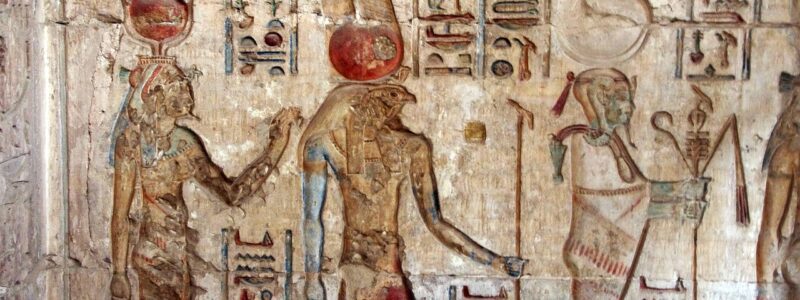Christ the Myth
Skeptics often opine that Christ is not real but propose Christ the myth. They suggest the Christ narrative is copied from a long line of other “gods” that have preceded Christ in time. There has been a history of gods and goddesses in ancient civilizations, each with specific characteristics that made them appealing to ancient peoples. These deities had diverse responsibilities. Some were for fertility, crops, various sicknesses, and celebrations, among many others. Skeptics object that out of all the gods and goddesses throughout ancient history, why should we believe Christ is a real “god”?

Dionysos
Skeptics support their conclusion by noting how many ancient gods – at least on the surface – had a similar history to Christ. For example, Christ’s first known miracle, where he turned water into wine at Cana during a wedding, is mimicked by Dionysos. Dionysos was credited with creating wine from nothing, outdoing Christ. Dionysos’ mere presence would turn water into wine. Maybe Christ’s miracle in Scripture was borrowed from an older miracle allegedly performed by an ancient Greek god.
Deities throughout Ancient History
The history of mankind is marked by belief in gods or “higher powers.” This belief system seems to run through every civilization with very few exceptions. Sometimes, these gods were benevolent, while others required human sacrifices.
Ancient history also shows many of these gods share certain characteristics with Christ. This has led to an army of “Jesus mythers.” who opine Christ is just another myth belonging to another civilization, time, and place. This army of skeptics is motivated by trying to disprove the existence of a divine Christ by claiming his story is just a rehashing of other myths common throughout history. Some of these myths even have their gods “dying and rising” from the dead – so-called savior myths.
It seems like every civilization throughout history had some form of belief in a god or gods. This seems to be a universal characteristic of every civilization throughout the world.
Why is that? Is this universal belief in god just the result of ancient civilizations attempting to make sense of their world before science, or does this prevail even today?
The God Instinct and Christ the Myth
A Pew Research Center article published in 2012 found that 84% of the global population believed in some higher power. The article noted,
Many of the unaffiliated hold some religious or spiritual beliefs (such as belief in God or a universal spirit) even though they do not identify with a particular faith.
But why is this true? Why is there a universal belief in a “higher being?” University studies propose our belief in theism is genetic in nature – it is engrained in our DNA. Bruce Hood, a professor of developmental psychology at Bristol University, studies beliefs in children in the United Kingdon and concluded
children have a natural, intuitive way of reasoning that leads them to all kinds of supernatural beliefs about how the world works.
Similarly, Olivera Petrovich, an Oxford University psychologist, extended his evaluation further by evaluating multiple international studies of religious belief systems in children. He opined that belief in God is actually “hardwired” in children and that “atheism is an acquired position.”
These studies are not unique to the United Kingdom. Studies were done at the Mind and Development Lab at Yale University note,
The universal themes of religion are not learned. They emerge as accidental by-products of out mental systems. They are part of human nature. … Creationism – and belief in God – is bred in the bond.
It seems that God matters to billions of people throughout the world. The expression of theistic beliefs resulted in various deities, and many of these deities resemble Christ in some way.
The question then becomes, was Christ just another fictional deity like Zeus or Apollo, or was he somehow different? Why should we worship Christ when there are so many alternatives available to pick from?
Common Characteristics Of Ancient Deities
J. Warner Wallace, in his book Person of Interest, observes that there are multiple common characteristics among the various gods of ancient civilizations.
- Predicted. Many ancient deities share the common characteristic of being predicted in some way. The coming of the deity is foretold by another deity, person, or prophet. The birth of Zoroaster, the god worshipped in Persia until modern times, was allegedly foretold from the beginning of time.
- Imperial. Many deities arise from a royal heritage in which one or both parents are kings, queens, princes, and princesses. The Greek god Adonis, worshipped from about 700 BC to 450 BC, was the son of King Theias and his daughter, Myrrha.
- Unexplainable. Some ancient deities are born of “unnatural” means. The Tibetan Hindu deity worshipped from 1400 BC to the present has been born in several unnatural ways depending upon the particular myth version. This might be a reasonable expectation from humans who think of their deities as exceptional and born from exceptional circumstances.
- Insulated. The god, as a child, is protected from external harm. The Buddha’s parents prevented him from seeing the world’s ugliness when he was young.
- Temptation. Some gods faced initiation through temptation. For example, demons were said to have tempted Krishna, who has been worshiped from 500 BC to the present. This may reflect the human expectation that gods would, through their temptation, come to understand humans better.
- Shepherds. Several deities were identified as shepherds. Osiris, the Egyptian god, was worshiped from 3300 BC to 30 BC and illustrated with a shepherd’s staff. If defined beings sometimes protect humans, it would seem reasonable they might be somehow identified with shepherds.
- Power. It would not seem unusual that some gods would have supernatural power; that is, after all, the nature of being a god.
- Interaction. Many of the ancient gods interacted with humans on some plane. Tammuz, the Mesopotamian god worshipped from 3000 BC to 1200 AD, interacts with humans, particularly a woman named Inanna, her brother Utu, and a local farmer. It seems reasonable that gods would interact with humans as they become known.
- Instructive. The interaction between gods and humans leads to the instruction of their human followers. Serapis, a Greco-Egyptian god, worshipped from 350 BC to 385 AD and taught the people about agriculture, music, arts, and religion. It would seem reasonable that deities would instruct their human worshipers on how to live a better life.
- Sacrifices. Many ancient deities needed sacrifices from their human worshipers. For example, Shangdi, the Chinese deity worshipped from 2230 BC to 1911 AD, desired animal sacrifices, especially of bulls and lambs. Their worshipers were expected to recognize their propensity for doing evil and the necessity for compensation or restitution for this evil in the form of sacrifices.
- Indicted. Many of these ancient gods faced some judicial trials. Dionysus, a Greek and Roman god worshipped from 650 BC to 185 BC, appeared before King Pentheus on charges of claiming to be a god.
It would seem like there are a lot of similarities between ancient deities and Christ. But none of these ancient mythologies contained all of these characteristics. Furthermore, while some characteristics might be shared, these characteristics are each very different from Christ’s. For example, while many of these deities entered the world unnaturally, the precise means they entered it differed significantly from Christ. Attis was conceived when the god Agdistis was castrated and bled into the ground. From this blood, a tree grew to produce almonds that a goddess collected. The goddess then held these almonds next to her bosom and conceived Attis. Krishna was conceived when his father, Vishnu, planted two hairs from his head into Krishna’s mother’s womb.
While there are many shared characteristics, the details differentiate mythologies from Scripture. Since antiquity, humans have had expectations of deities; they are powerful and demand sacrifice but show people how to live better. Sometimes they might be tempted but triumph over the temptations. They might be insulated from the world as a child but learn how to conquer it as an adult. Each of these gods had some of humankind’s expectations, and only Christ had them.
Summary of Christ the Myth
Critics have argued that many other gods share Christ’s historical characteristics throughout history. They noted how some have supernatural powers, were born with extraordinary characteristics, were tempted, were protected as a child, sometimes in a foreign country, etc.
However, upon closer examination, these characteristics are far from those experienced by Christ.
Only Christ had all of these characteristics; as we shall see in the next post, these characteristics were predicted long before Christ was born.




